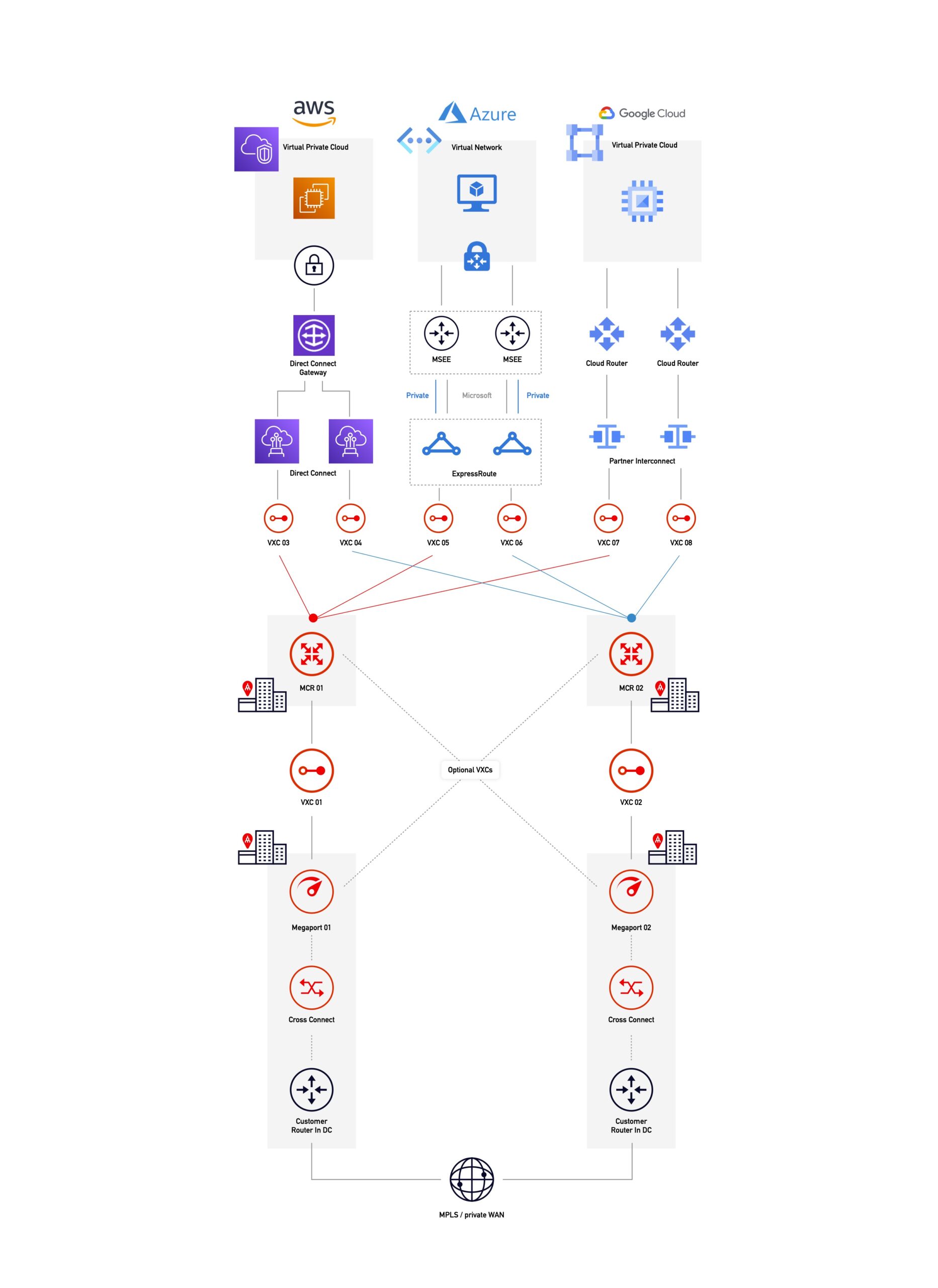
About NXP Semiconductors
NXP Semiconductors N.V. enables secure connections for a smarter world, advancing solutions that make lives easier, better, and safer. As the world leader in secure connectivity solutions for embedded applications, NXP is driving innovation in the automotive, industrial & IoT, mobile, and communication infrastructure markets. Built on more than 60 years of combined experience and expertise, the company has approximately 29,000 employees in more than 30 countries and posted revenue of $8.61 billion in 2020. Find out more at www.nxp.com .
Key Points
- Uses Megaport’s Network as a Service (NaaS) for multicloud connectivity to AWS, Microsoft Azure, and to other cloud providers over time.
- Spun up and connected a new cloud environment to support NXP’s North American region in only a week - reducing launch timeline by nearly 6 months.
- Lowered latency by reducing the amount of inter-cloud traffic hairpinning to NXP’s on-premises data centers.
- Enabled greater network agility with dynamic scaling of bandwidth and deployment of virtual routers and connections that allow for quick setup and teardowns of testing environments.
- Enabled a Cloud Center of Excellence supporting 9,000+ global engineers with private connectivity to support high-availability.
Case Study Snapshot
As part of an enterprise-wide initiative to migrate applications to the cloud from an already consolidated data center footprint in several regions, NXP established a Cloud Center of Excellence. The applications serve, amongst others, over 9,000 hardware and software engineers dedicated to designing and manufacturing semiconductor chips found almost everywhere in our everyday lives - in smartphones, credit cards, cars, household appliances, and IoT devices. Megaport is NXP’s dedicated cloud connectivity provider for their Cloud Center of Excellence.
Challenges
Building a Cloud Center of Excellence
When NXP’s CIO asked Henk Coenen, the company’s Head of Cloud Center of Excellence, what the multibillion-dollar semiconductor company needed to do to get serious about the cloud, Coenen held nothing back. He answered that they needed to accelerate cloud migrations by building an easy and transparent cloud-native platform to help NXP end-users and engineers innovate faster, while maintaining security and financial controls.
The first step was to build a cloud landing platform to support, over time, over 9,000 NXP engineers, whom Coenen calls his “cloud customers,” anyone hosting an application or service in the cloud.
“We took care of cloud policy, access management, connectivity, security, and finance controls,” Coenen said. “We are helping the business do all things and applications in the cloud.”
A year and a half later, many of NXP’s mission-critical compute-heavy applications are in the process of migrating to the cloud, along with a mix of IT and business workloads. These applications include High- Performance Computing (HPC) cloud bursting for the hardware design of semiconductor chips, Splunk data analytics, data lake building, and enterprise-wide business intelligence.
“With Megaport, we were fully up and running with our cloud landing platform within a week. The whole process was very automated. So we went from a half a year timeline to a week or so.”
Henk Coenen, Head of Cloud Center Excellence, NXP
Solution
A multicloud solution built for resiliency
After consolidating their colocation footprint to several regional data centers, NXP established Megaport connectivity in these facilities. Using a set of Megaport Ports and Megaport Cloud Routers (MCRs), NXP was able to build a hybrid multicloud architecture by provisioning resilient data center connectivity and layer 3 cloud routing in each region. Resiliency is a requirement for continued operation during any possible connectivity interruptions due to a fiber cut or device failure, or planned maintenance.
NXP is currently connecting to multiple cloud regions in AWS and Microsoft Azure. With Megaport, NXP’s cloud environments connected to a cloud on-ramp can communicate directly without traffic having to be hairpinned to the NXP on-premises location. And when NXP IT or business lines require connecting to another cloud provider, like Google Cloud, NXP can accommodate that on demand and through existing ports.
Benefits
Spinning up multicloud for an entire region in a week
When Coenen was tasked with establishing a temporary data center in the US region to serve NXP’s North American engineers, he turned to Megaport because establishing the same network connections using traditional telco providers could have taken up to six months.
“With Megaport, we were fully up and running with our hardware design and simulations within the week,” Coenen said. “The whole process was very automated. So we went from a half a year timeline to a week or so from a connectivity point of view.”
Coenen also appreciated the flexibility and the pay- as-you-go billing of the Megaport solution. He could spin up a lot of connections quickly during high-demand periods and break them down just as easily without worrying about the costs. This flexibility was especially useful for testing purposes.

Future Plans
NXP is currently evaluating plans to use Megaport in its APAC regional data center and continues to migrate more applications into the cloud.
